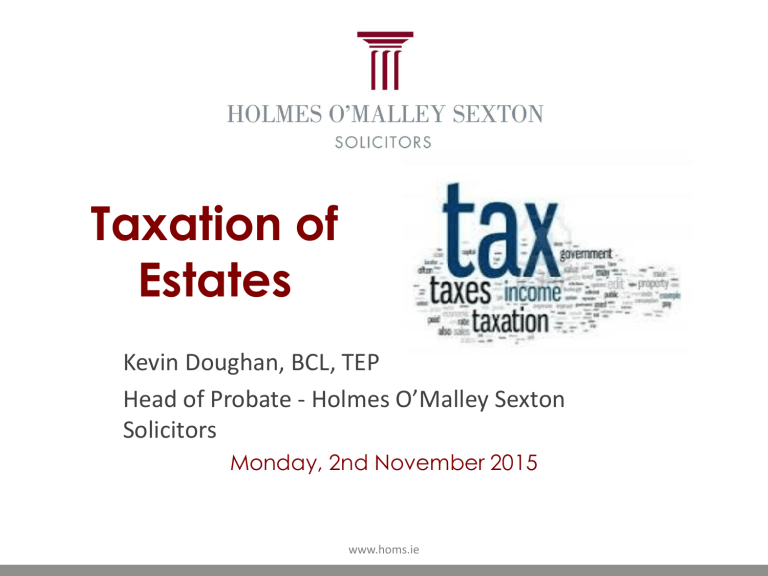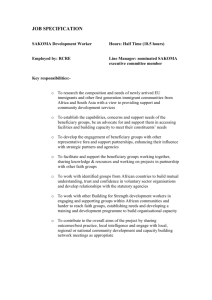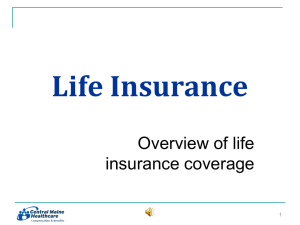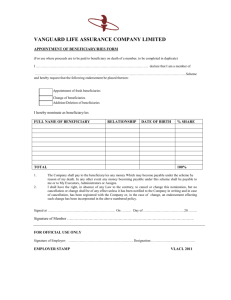Taxation of Estates
advertisement

Taxation of Estates Kevin Doughan, BCL, TEP Head of Probate - Holmes O’Malley Sexton Solicitors Monday, 2nd November 2015 www.homs.ie Inheritance Tax Capital acquisitions tax • Covers inheritance and gift tax • Current rate of CAT- 33% CAT payable if A) Deceased resident/ordinary resident in Ireland or B) beneficiary is resident/ordinary resident in Ireland C) Assets are situated in Ireland If a or b applies- a worldwide liability Beneficiary Based Tax Tax Free Thresholds • Depends on degree of relationship • Group A- children, and minor children of a predeceased child (includes Step children, adopted children and foster children (criteria apply))- €225,000 (2015) • Group B- brother, sister, niece, nephew, and grandchildren€30,150 • Group C- everyone else-€15,075 • Determined by blood connection- in-laws are not your relatives (Common mistake) • Aggregation system- 5th December 1991- bundling benefits together- reduces threshold available. • Pre-Death• A well thought out Will. • Power of Appropriation- allows Executors or Trustees to redirect assets to specific beneficiaries who may qualify for reliefs to minimise Tax. • Post Death• Disclaimers- no obligation on any beneficiary to accept an inheritance. A disclaimer can be used to direct an inheritance to beneficiaries in a tax efficient manner. • Succession Rules determines who benefits- not always the intended result. • Word of Caution- professional advice should be sought on the correct application of disclaimers Reliefs- Spouses and Civil Partners • Exempt from CAT. • Must be spouse/civil partner- a divorced spouse is no longer your spouse. • Does not apply to co-habitants. Surviving spouse relief. • Where a spouse of a deceased relative inherits. • Spouse qualifies for threshold that relative would have had. • Automatically applies- so can in rare occasions can have adverse consequences. Small Gift Exemption • The first €3,000 from any person is exempt from CAT. • Applies only to gifts not inheritances. • Effective way of passing wealth while alive. • Over 20 years you could pass €60,000 to a person tax free. Dwelling-house relief • Applies to dwelling houses. • Exempt from CAT irrespective of value or relationship to deceased. Conditions • A) 3 years occupancy before date of inheritance. • Must not have an interest in another house (including a foreign house). • If under 55, must continue to occupy the dwelling-house for further 6 years. Can be sold, but must re-invest fully in a new dwelling within a year. Partial investment= partial claw-back • No claw-back if sold as beneficiary needs long term nursing home care or due to employment circumstances Agricultural relief. • Applies to agricultural property/Assets. • Market value is reduced by 90%- only 10% is subject to CAT. • Applies to farmland, machinery, livestock, farm buildings, and single farm payments. • Test- 80% of assets held on valuation date must be agricultural in nature. • Claw-back if sold within 6 years and not replaced with agricultural property. • Conditional bequest- to acquire agricultural property. • Budget 2014 changes- must be active farmer or lands let to person who is an active farmer for 6 years. Other reliefs • • • • Business Relief Favourite nephew relief. Exemption of certain inheritances by parents (must have taken a non-exempt gift or inheritance from child within 5 years of death of child) • Section 72 type policies of insurance- where used to pay CAT. • Exemption relating to qualifying expenses of incapacitated persons (See above). • Group a threshold- for parents inheriting an absolute interest from children. Discretionary Trust Tax • Encourages trustees to pay out from trusts • 6% initial Levy • IL applies on the latest of a) Death of testator, b) date trust created, c) date upon which no principal objects under 21 • Payable within 4 months of valuation date • Annual levy of 1% of value of funds on 31st December each year • Refund of Initial levy if trust ceases within 5 years. • Trusts exclusive for incapacitated beneficiaries- Exempt • Tip- Set up separate trusts. Capital Gains Tax • Tax on the increase in value of assets. • No CGT arises on assets passed to a beneficiary under a Will/Intestacy. • Will only arise in an estate if there is a disposal/sale of assets. • Assets inherited at market value at date of death- BASE COST • If there is a loss, can be set-off against other gains in the estate • If no gains- loss will remain unused. • Consider the transfer of the assets to a beneficiary so he/she can use the loss. • Losses cannot be carried back- can only be carried forward. Income Tax • Executors are responsible for pre-death income and to file appropriate tax returns. • Post death income belongs to estate and liable to flat rate of income tax @ 20%. • Any income received during administration of the estate is paid net of income tax to beneficiary. • A form R185 (notice of tax deductions) should be given to beneficiary to claim credit for tax deducted. • Tax assessed on gross income in hands of beneficiary. Recent Budget 2016 changes • The only change made by the recent budget increased the Group A threshold- gifts/inheritances by children from parents to €280,000. • Applies to benefits received from the 12th October 2015. • No changes to other tax groups. • The change is the start of the process to increase incrementally the threshold to €500,000 over next 3-4 years. • Rate of CAT remains @ 33% Contact Details KEVIN DOUGHAN, SENIOR SOLICITOR, TRUST PRACTITIONER and TAX ADVISOR P: 061 313222 E: kevin.doughan@homs.ie Disclaimer • Kevin Doughan and Holmes O Malley Sexton Solicitors accept no liability for the content of these guidance notes, or for the consequences of any actions taken on the basis of the information provided, unless that information is subsequently confirmed in writing by Holmes O Malley Sexton Solicitors. The information contained in this guide, is for general information purposes only. While the information provided is up to date, no representations or warranties of any kind, express or implied, about the completeness, accuracy, reliability, suitability is given, with respect to the information contained for any purpose. Appropriate legal advice should be taken at all times. Any reliance you place on such information is entirely at your own risk. • © Kevin Doughan





